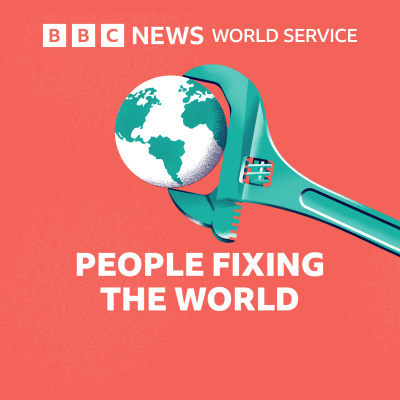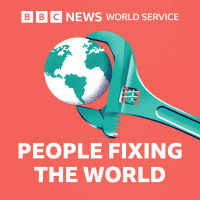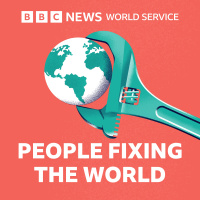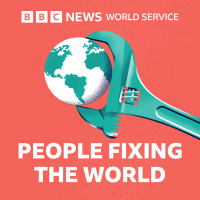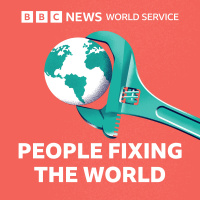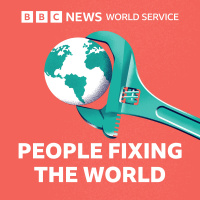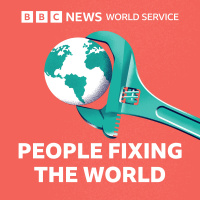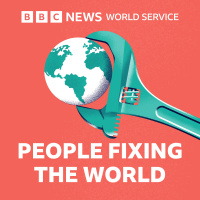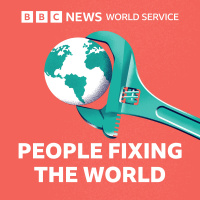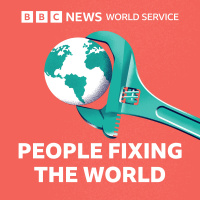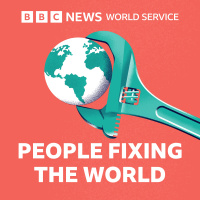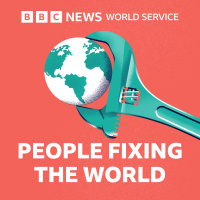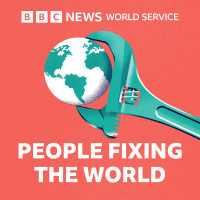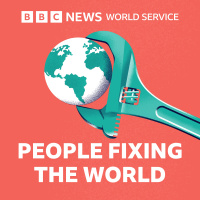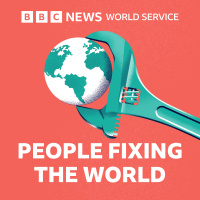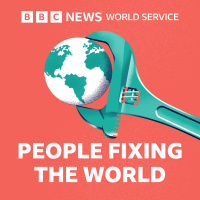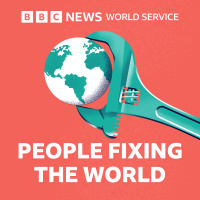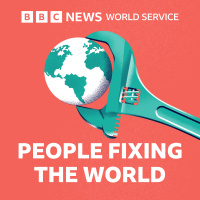Sinopsis
Brilliant solutions to the worlds problems. We meet people with ideas to make the world a better place and investigate whether they work.
Episodios
-
Bringing dead languages back to life
27/02/2024 Duración: 24minAustralia used to be one of the most linguistically diverse places, with over 200 languages. Today, many of Australia’s indigenous languages are considered “highly endangered”. Inspired by his native language, Hebrew, Ghil’ad Zuckermann is a linguistics professor who is on a mission to revive Australia’s dead and endangered languages, painstakingly piecing them back together from historical documents. We speak to Ghil’ad and Shania Richards from the Barngarla community, whose language is being brought back from the brink. Presenter: Myra Anubi Reporter/producer: Josephine Casserly Producers: Claire Bates & Craig Langran Series producer: Tom Colls Sound mix: Annie Gardiner Editor: Penny Murphy Email: peoplefixingtheworld@bbc.co.uk Image: Shania Richards, in the uniform of the Youth Governor of South Australia
-
Making life easier for older people
20/02/2024 Duración: 23minBarcelona in Spain is famous for its beautiful streets, lined with tall apartment buildings. But the architecture is a problem for many people who have lived for years in upstairs apartments but who now find the stairs unmanageable.In 2008, a survey found that in one district there were 300 people who could not leave their homes alone. A group of volunteers decided to do something about this and got hold of a special wheelchair with caterpillar tracks, so it can be used to take people up and down stairs. After an initial pilot scheme they launched a local service called “Let's Go Down to the Street”, to help elderly residents go shopping or meet up with friends. Sixteen years on, the service is offered across the city.Plus, we visit a home for senior citizens in an unlikely location: a university campus. The Mirabella complex at Arizona State University in the US offers its residents the chance to sample the college lifestyle – from lectures to shows and sports fixtures.Presenter: Myra Anubi Producer: William
-
Overcoming stigma
13/02/2024 Duración: 23minOn this edition of People Fixing The World we meet people who’ve helped overcome long-standing cultural biases to create better outcomes for everyone. In India we hear about the social media campaigns which have helped city dwellers in Bengaluru see those who pick waste from rubbish dumps not as dangerous and dirty but as invaluable recyclers. In Nigeria we meet a traditional healer and a health worker who are collaborating to help improve the treatment of psychosis and break down some of the unhelpful attitudes towards severe mental health problems.Presenter: Myra Anubi Reporter/producer: Makuochi Okafor, Claire Bowes Series producer: Jon Bithrey Editor: Penny Murphy Sound Mix: Andrew Mills(Image: Chief Mukaila Yusuf, BBC)
-
Rewilding Earth
06/02/2024 Duración: 23minFrom beavers in the UK to bison in Romania and jaguars in Argentina, ecologists around the world are reintroducing animals that once flourished in particular areas. The theory is, if done correctly, they can boost biodiversity and restore ecosystems with benefits ranging from reducing forest fires to tackling invasive species. But the strategy is controversial. Opponents say some species are no longer suited to certain areas and cause conflict with farmers, adding there is little evidence it works. Proponents admit some well-meaning projects haven’t worked in the past, but insist properly planned rewilding, which has involved all the stakeholders from the start, can be very successful. We take a close look.Presenter: Myra Anubi Reporter/producer: Claire Bates Series producer: Jon Bithrey Editor: Penny Murphy Sound mix: Gareth Jones
-
Keeping the Amazon standing
30/01/2024 Duración: 23minThe Amazon is the largest forest in the world, spread across nine countries in South America and home to 47 million people. It’s crucial for the planet’s biodiversity and in the fight against climate change. But vast numbers of trees have been cut down for logging, construction, mining and farming. On this edition of People Fixing The World we meet those who are making a living from the Amazon while keeping the trees standing - through rubber tapping and fruit picking - as well as big companies looking to make more of the fruits, nuts and other natural products. Presenter: Myra Anubi Reporter: Julia Carneiro Series Producer: Jon Bithrey Editor: Bridget Harney Sound mix: Andrew Mills (Image: Brazilian entrepreneur Francisco Samonek, BBC/Julia Carneiro)
-
Fake birds and other stories
26/12/2023 Duración: 23minThis week we have a host of great ideas inspired by solutions we've told you about in 2023.We find out how scientists are using fake birds to help populations of seabirds to recover. By putting out model birds in restored habitats they trick the real ones into nesting there.Then we have the heartwarming tale of Theo – a man in his seventies - and Bickel the dog. We look at how dog sharing can deal with loneliness and bring improved health and happiness.And we uncover an innovative way of dealing with the scourge of Japanese knotweed - by turning it into paper.Presenter: Myra Anubi Producers: Richard Kenny, Zoe Gelber, Claire Bates Series Producer: Jon Bithrey Editor: Bridget Harney Sound mix: Hal Hainesemail: peoplefixingtheworld@bbc.co.uk(Image: Jessica Vagg with a tern decoy, BBC/Richard Kenny)
-
Making landfill less awful
19/12/2023 Duración: 23minLandfill sites are an icon of our wasteful society and the harm we cause to Planet Earth.But around the world, people are trying to make these filthy places a little bit better.We visit the human-built island in Singapore made of burned waste that has become a thriving ecosystem.And in France, we hear how gas leaking from landfill sites is being collected as a source of energy.Presenter: Myra Anubi Reporter/producer: Claire Bowes Singapore reporter:Tessa Wong Series Producer: Jon Bithrey Editor: Bridget Harney Sound mix: Annie Gardineremail: peoplefixingtheworld@bbc.co.uk(Image: Semakau island, Singapore National Environment Agency)
-
The country tackling loneliness
12/12/2023 Duración: 23minLoneliness affects millions of people around the world and can have a significant impact on our mental and physical health.In the Netherlands, they are taking the problem seriously, with a national coalition of organisations all trying to bring people together and build connections.We visit a youth club teaching teenagers how to overcome shyness and social anxiety. Plus, we drop in on a soup-making session that's bringing the generations together, and breaking down stereotypes.Presenter: Myra Anubi Reporter/producer: Claire Bates Series Producer: Jon Bithrey Editor: Bridget Harney Sound mix: Gareth Jonesemail: peoplefixingtheworld@bbc.co.uk(Image:Queen Maxima of the Netherlands at Oma's Soup)
-
Building a clinic to save a forest
05/12/2023 Duración: 24minHow do you stop people chopping down precious rainforest? In the Indonesian part of Borneo, researchers for a conservation charity discovered that local people were chopping down the rainforest around them for an incredibly understandable reason – they needed to pay for medical treatment for themselves and their children.So they started a project that would hopefully protect the forest and help the local communities at the same time. They built a health centre and gave people a big discount on medical care if they stopped chopping down the trees. Ten years on, we visit the forest to see what happened next.Presenter: Myra Anubi Reporter: Ade Mardiyati Producer: Craig Langran Series Producer: Jon Bithrey Editor: Bridget Harney Sound mix: Hal Hainesemail: peoplefixingtheworld@bbc.co.ukImage: Baby orangutan in Borneo forest
-
The plastic eaters
28/11/2023 Duración: 23minEvery year the world produces 400 million tonnes of plastic – the same weight as all the humans on earth.Only a small proportion of this is recycled, and this isn’t proper recycling but “downcycling” – the new plastic is of a lower quality, meaning that almost all plastic eventually goes to waste.But now French company Carbios is using enzymes to break plastic down into its chemical building blocks – which can then be used to make high quality plastic again.So is plastic on the brink of becoming a resource like glass or aluminium, that you can keep on moulding and recycling again and again?Presenter: Myra Anubi Reporter/producer: William Kremer Series producer: Jon Bithrey Sound mix: Gareth Jones Editor: Penny Murphyemail: peoplefixingtheworld@bbc.co.uk
-
Fighting period poverty
21/11/2023 Duración: 23minMillions of women around the world lack access to safe and hygienic menstrual products. But there are people trying to change that.We meet the British student who learned to sew in lockdown and started making reusable sanitary pads for refugees. She’s helped distribute tens of thousands of pads and is now training refugee women in Lebanon how to make money by sewing the pads themselves.We hear about a design project inspired by tea cups which has created an efficient way of washing reusable pads.And in India we meet the woman who is challenging the stigma around periods with a comic book that’s being read in thousands of schools around the country.Presenter: Myra Anubi Reporter: Lorna Acquah Producer: Lizzy McNeill Series producer: Tom Colls Sound mix: Annie Gardiner Editor: Richard Vadonemail: peoplefixingtheworld@bbc.co.ukImage: Reya, a student in Beirut who is sewing period pads
-
Sharing the river
14/11/2023 Duración: 23minIn the farming community of Los Negros in rural Bolivia, the river is their life and livelihood. So when that river started to dry up, it made life very hard. They blamed the villages upstream for not looking after their precious water.This conflict could have turned ugly. But with the support of a local charity, what came out of it instead was a ground-breaking agreement. After years of negotiations, the town at the bottom of the river agreed to support the communities upstream to protect their forests and keep the river healthy.The idea is now the blueprint for water sharing agreements between communities across the continent.Presenter: Myra Anubi Reporter: Jane Chambers Producer: Bob Howard Series producer: Tom Colls Sound mix: Hal Haines Editor: Penny MurphyEmail: peoplefixingtheworld@bbc.co.ukImage: Senor Rogelio Valverde sits by his water source
-
Training heroin users to save their friends
07/11/2023 Duración: 24minHeroin users in Scotland are being trained to spot when someone is about to overdose and to step in and help.The training – which includes lessons on how to use the antidote naloxone - is often led by people who have themselves been addicts.Taxi drivers and police officers are also being trained, and naloxone being widely distributed, as part of a push to save as many lives as possible.Reporter Craig Langran investigates whether the approach is working.Presenter: Myra Anubi Producer: Craig Langran Series producer: Tom Colls Sound mix: Annie Gardiner and Hal Haines Editor: Penny MurphyEmail: peoplefixingtheworld@bbc.co.ukImage: Wez, who trains heroin users how to administer naloxone
-
Disaster zone innovators
31/10/2023 Duración: 24minIn the midst of a crisis, sometimes the solution you need isn’t obvious. Today we meet the inventors who found fascinating fixes amid the chaos and destruction of disasters. We visit the hospital that was painstakingly constructed inside a train, to treat Ukrainian civilians in a war zone. We follow a team in Fiji who have created a mobile workshop, designed to travel to remote villages after natural disasters and repair and make items on the spot. Finally we look at a medical robot that could soon treat injured people in places it’s too dangerous for human rescuers to enter. Presenter: Myra Anubi Reporter/Producer: Claire Bates Series producer: Tom Colls Sound mix: Gareth Jones Editor: Penny Murphy Picture: University of Sheffield AMRC
-
Sea cucumbers fixing the world
24/10/2023 Duración: 24minMeet the oceans’ unsung hero - the humble sea cucumber. An animal in the same family as starfish that looks like a lumpy sausage and lives on the ocean floor could help with some of the impact of global warming, pollution from fish farms and damage from the fishing industry that are threatening some of the oceans most important ecosystems.We meet the Australian researchers using drones to count the cucumbers to understand how their poo is helping coral reefs. And in Madagascar, we speak to the local communities which are learning to sustainably farm the creature, protecting the seas and increasing their income along the way.Repeat - originally broadcast in February 2023.Presenter: Myra Anubi Producer/Reporter: Lizzy McNeill Series producer: Tom Colls Sound mix: Annie Gardiner Editor: Penny MurphyEmail: peoplefixingtheworld@bbc.co.uk(Image: Sea cucumbers. Credit: Getty Images)
-
Stopping suicide
17/10/2023 Duración: 26minMore than 400 people in Ireland took their own lives in 2022. In Limerick, helicopters are often heard flying above the city in search of missing people in the River Shannon.But in response to this tragic situation, a group has sprung up to patrol the Shannon in the evenings to speak with people who are feeling desperate. Katie Flannery joins them on a Saturday night to see how they work and to hear their stories.We also hear about a law that is under consideration in several US states, which would allow people with mental health problems to voluntarily put themselves on a do-not-sell list for firearms.This programme contains discussion of suicide and suicide attempts. If you feel affected by this topic, you can speak to someone who can help. Go to befrienders.org to find a crisis phone line where you live.Presenter: Myra Anubi Reporter: Katie Flannery Producer: William Kremer Series producer: Tom Colls Sound mix: Gareth Jones Editor: Penny MurphyEmail: peoplefixingtheworld@bbc.co.ukImage: Limerick Suicide Wa
-
AI for good
10/10/2023 Duración: 24minArtificial intelligence can sometimes provoke fear and anxiety. Will it take away our jobs? Will it take over the world? So it’s important to recognise some of the good things AI is being used for. We look at how AI chatbots are helping people tackle anxiety, how AI is being used in Africa to lower infant mortality and even speak to the team using AI to try and communicate with bats. Presenter: Myra Anubi Producer: Lizzy McNeill Series producer: Tom Colls Sound mix: Hal Haines Editor: Penny Murphy Email: peoplefixingtheworld@bbc.co.uk Image: An illustration of a digital brain (Getty Images)
-
Coconuts fixing the world
03/10/2023 Duración: 23minWe eat millions of tonnes of coconuts every year - with the dense white flesh of the fruit making a tasty snack and the juice a refreshing drink.But the inedible husk and shell go to waste – and it’s this part that innovators and entrepreneurs around the world are now putting to work to solve a whole host of problems.In Sierra Leone, a personal tragedy was the catalyst for young entrepreneur Alhaji Siraj Bah to start a business which takes the coconut husk and turns it into an alternative to charcoal - which is good for the forests and could potentially save lives too.And we’ll hear about the start-up using coconut to keep fish, fruit and vegetables cool for longer, without using any plastic.Presenter: Myra Anubi Reporter: Eric Mugaju Producer: Craig Langran Series producer: Tom Colls Sound mix: Gareth Jones Editor: Penny MurphyEmail: peoplefixingtheworld@bbc.co.ukImage: A coconut (Getty Images)
-
Surviving earthquakes
26/09/2023 Duración: 23minEarthquakes strike suddenly, leaving death and destruction in their wake. But around the world, people are trying to do what they can to make them less deadly.We hear from Haiti, where a seismometer developed for hobbyists is now being used by citizens to build the country’s first earthquake risk map.Over in Zurich, we meet the scientist using tennis balls to buffer buildings in poor countries from shockwaves. And in Indonesia, we find out how a Virtual Reality game is helping students prepare for terrifying tremors.Presenter: Myra Anubi Reporter: Claire Bates Series producer: Tom Colls Sound mix: Hal Haines Editor: Penny MurphyEmail: peoplefixingtheworld@bbc.co.ukImage: A woman in Haiti holding a Raspberry Shake (Credit: Eric Calais)
-
Shockwaves for the heart
19/09/2023 Duración: 23minHeart disease and other cardiovascular diseases are the biggest killer in the world, causing 18 million deaths globally every year.Cardiologists and heart surgeons try to manage heart disease with stents, surgery and drugs, but the organ itself does not heal. Finding a way to regenerate heart tissue has become a holy grail for medicine.Now there is new hope from a strange and pioneering technique from Austria. Doctors there believe that applying shockwaves directly to the heart after surgery dramatically improves patient outcomes.The shockwaves – which are sonic pressure waves, rather than electric shocks – lead to new growth of blood vessels and trick the body’s immune system into action.The BBC’s global health correspondent Naomi Grimley travels to Innsbruck to see the treatment in action.Presenter: Myra Anubi Producer: William Kremer Series producer: Tom Colls Sound mix: Hal Haines and Gareth Jones Editor: Penny MurphyEmail: peoplefixingtheworld@bbc.co.ukImage: Heart surgery
